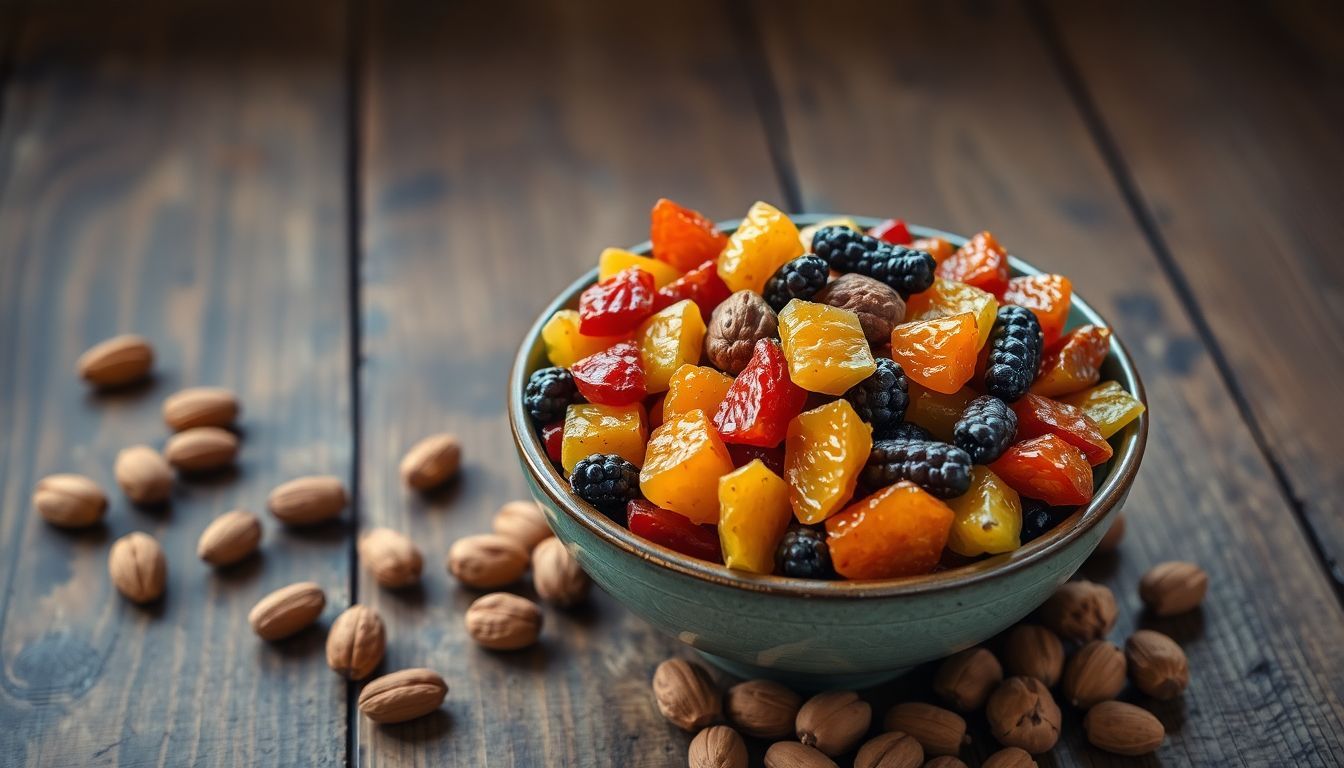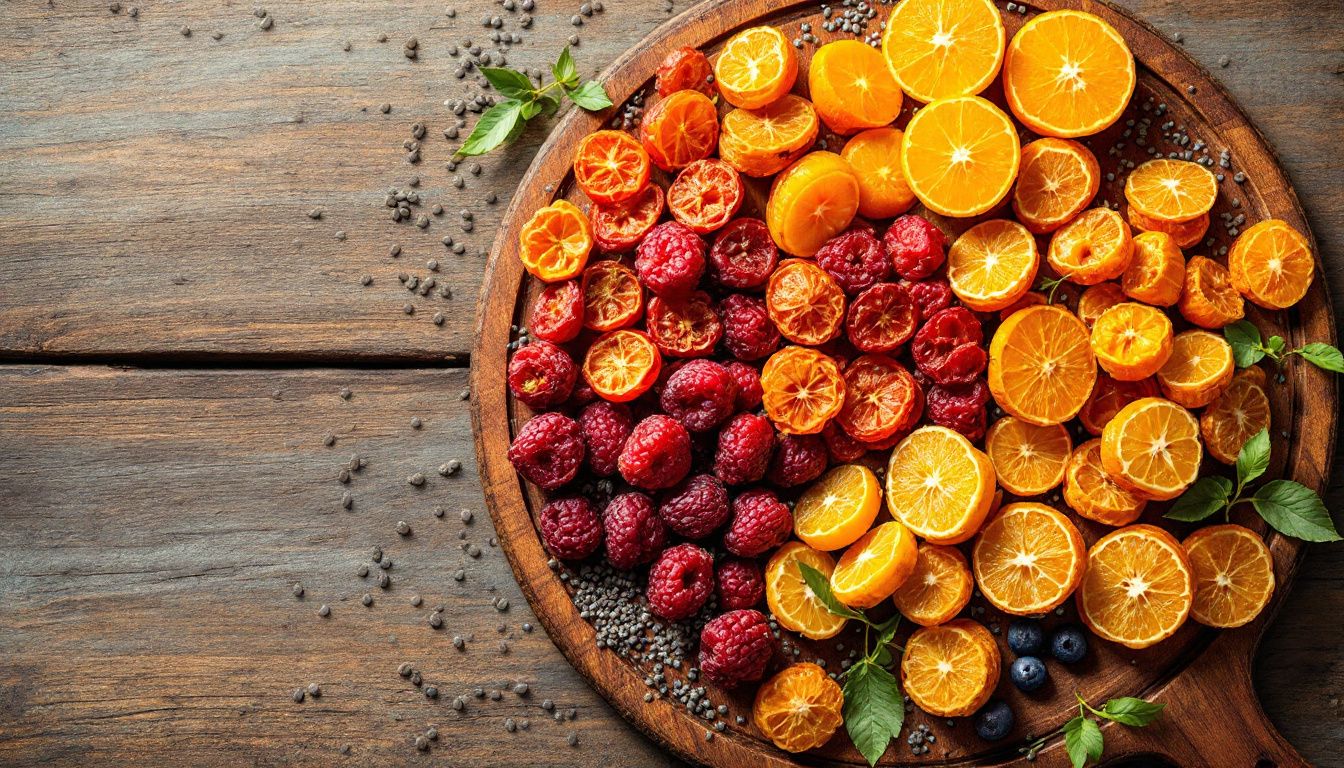Many people wonder if dried fruits are healthy for their diet. These snacks are packed with vitamins, fiber, and antioxidants—making them nutritious in small amounts. This blog will explore the pros and cons of eating dried fruit and share tips on choosing the healthiest options.
Thank you for reading this post, don't forget to subscribe!Keep reading to learn how dried fruits can fit into your healthy lifestyle!
Key Takeaways
- Dried fruits are rich in fiber, antioxidants, and vitamins (K, B12, C) but have concentrated sugars and calories.
- Raisins (59% sugar) and dates (66% sugar) can spike blood sugar if eaten in large amounts.
- Low-sugar choices like unsweetened dried apples or freeze-dried strawberries are better for weight management.
- Studies suggest 3–5 servings of dried fruit weekly may lower risks for certain cancers, including bladder and colon cancer.
- Portion control is key; overconsumption may lead to weight gain due to high caloric density.
Nutritional Benefits of Eating Dried Fruit
Dried fruit packs a lot of nutrients into small pieces. It provides key vitamins, minerals, and fiber to support overall health.
Rich in Fiber and Antioxidants
Dried fruit contains a lot of dietary fiber, which helps with digestion. Fiber can ease constipation and support weight management. It keeps you full longer and promotes healthy gut bacteria.
For example, dried plums are known to act as natural laxatives due to their high fiber content.
Antioxidants in dried fruit fight oxidative damage in the body. Raisins and dried cranberries are especially high in polyphenol antioxidants. These compounds may reduce risks of heart disease by lowering blood pressure and cholesterol levels.
Vitamins like vitamin C also boost antioxidant activity, protecting your cells from harm—leading us into its role in providing vital vitamins and minerals next!
High in Vitamins and Minerals
Raisins, prunes, and dates pack a punch with their nutrients. They hold up to 3.5 times more vitamins and minerals than fresh fruit due to the drying process. This makes them rich in vitamin K, B12, iron, and potassium.
Prunes support bone health with their high levels of vitamin K and help relieve constipation thanks to dietary fiber. Raisins assist in lowering blood pressure while improving blood sugar control—beneficial for type 2 diabetes management.
Dates offer antioxidants that fight disease while boosting overall nutrition.
Potential Downsides of Dried Fruit
Dried fruit can pack a lot of sugar and calories in small servings. Eating too much might lead to weight gain or blood sugar spikes.
High Sugar Content
Many dried fruits, like raisins and dates, are packed with natural sugars. Raisins contain about 59% sugar, while dates have up to 66%. This high sugar content can spike blood sugar levels if eaten in large amounts.
Around 22-51% of the sugar in these snacks is fructose. Overeating fructose may lead to health problems like type 2 diabetes or weight gain. Some dried fruits also include added sugars, which raise their calorie content even more—this increases risks for obesity and heart disease.
Always check labels to avoid options with extra sweeteners.
Increased Caloric Density
Dried fruit has more calories in a smaller portion compared to fresh fruit. Removing water during the drying process makes dried fruit energy-dense. For example, 1 ounce of raisins contains about 84 calories, most coming from sugar.
Fresh grapes offer fewer calories for a larger serving.
Overeating dried fruits can lead to extra calorie intake, which may affect weight management. The natural sugars become concentrated as the moisture is removed. While they make a healthy snack in moderation, practicing portion control is key for balancing their calorie content in your diet.
Comparing Health Benefits: Dried Fruits vs. Other Healthy Fats like Extra Virgin Olive Oil
Dried fruits and extra virgin olive oil (EVOO) are nutrient-dense staples—but they offer different benefits. Let’s break it down to see how they compare in key health areas.
| Category | Dried Fruits | Extra Virgin Olive Oil (EVOO) |
|---|---|---|
| Main Nutrients | Fiber, antioxidants, vitamins (A, E, K), potassium, and iron. | Monounsaturated fats, vitamin E, and polyphenols. |
| Heart Health | May reduce systolic blood pressure due to potassium content. High fiber aids heart health. | Known to reduce bad cholesterol (LDL) and support heart function. Full of healthy fats. |
| Energy Density | Calorie-dense due to natural sugars and reduced water content. | High caloric value, but fats offer longer-lasting energy compared to sugars. |
| Weight Management | Studies (2020) suggest lower BMI in adults consuming dried fruit regularly. | Healthy fat intake helps with satiety, reducing overeating risk when used moderately. |
| Anti-Inflammatory Properties | Rich in antioxidants like polyphenols, which may reduce inflammation risks over time. | Polyphenols in EVOO combat inflammation and oxidative stress effectively. |
| Cancer Risk Reduction | 3–5 servings weekly may lower risks of bladder, colon, and stomach cancers (2020 review). | Linked to a lower risk of breast and colorectal cancers in Mediterranean diets. |
| Practical Uses | Perfect as snacks, toppings, or blended into smoothies. | Ideal for cooking, dressing salads, or as a bread dip. |
Both have unique strengths. Fiber in dried fruits benefits digestion, while EVOO’s fats boost heart health. Choosing the right option depends on your nutritional goals—but balance is key.

Best Choices for Healthy Dried Fruits
Picking the right dried fruit can make a big difference for your health. Focus on options with less sugar and natural flavors to enjoy as a snack.
Low-Sugar Options
Choose dried fruits without added sugar. Dried grapes like raisins and dried apricots are good options. These have natural sweetness and plenty of dietary fiber. They also contain vitamins like vitamin K, which supports bone health.
Some low-sugar choices include unsweetened dried apple slices or freeze-dried berries. These snacks keep the flavor while cutting down on sugar content. Read nutrition facts labels carefully to avoid hidden sugars in packaged products…
Next, let’s explore freeze-dried alternatives!
Freeze-Dried Alternatives
Freeze-dried fruits are a crunchy, healthy snack. They retain most of their vitamins, minerals, and dietary fiber during the drying process. This makes them a great choice for those wanting nutrient-rich foods without added sugar or preservatives.
Popular options include freeze-dried strawberries, apples, and even beet chips. These snacks appeal to picky eaters and toddlers due to their light texture.
Stick with unsweetened varieties to avoid extra sugar content. Freeze-drying preserves flavor while keeping calorie content lower compared to other dried fruits loaded with sugars.
These snacks can help manage weight and provide quick energy without spiking blood sugar levels too much—important for type 2 diabetes prevention!
Conclusion
Eating dried fruit can be a healthy snack if you choose wisely and watch portions. It’s packed with fiber, vitamins, and antioxidants but also has concentrated sugars and calories.
Fresh fruit is better for hydration and lower sugar content, though both have unique benefits. Pick low-sugar or freeze-dried options for smarter choices. Balance is key to fitting dried fruits into a healthy diet!
